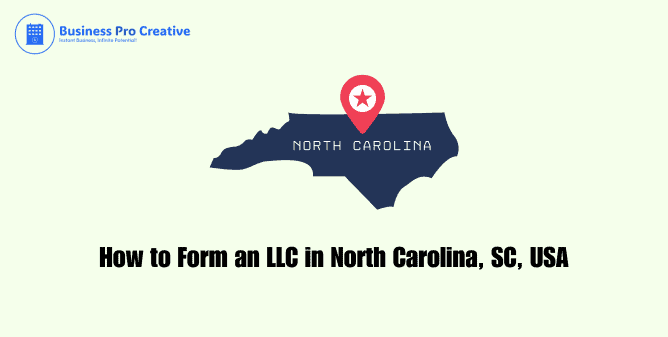
To form an LLC in North Carolina, you’ll need to choose a unique business name, appoint a registered agent, and file Articles of Organization with the Secretary of State for a $125 fee. You’ll also create an operating agreement, obtain necessary licenses, and apply for an EIN from the IRS. The process offers personal asset protection and tax flexibility, but comes with ongoing requirements like filing annual reports ($200 fee) and maintaining accurate records. While it’s more expensive than a sole proprietorship, an LLC provides enhanced credibility and less paperwork than a corporation. Discover more about the economic landscape and support resources available for your new North Carolina LLC.
What Are the Steps to Form an LLC in North Carolina?
Entrepreneurs looking to establish an LLC in North Carolina need to follow a series of steps.
First, choose a unique business name and appoint a registered agent.
Then, file Articles of Organization with the Secretary of State and pay the required fee.
Create an operating agreement, obtain necessary licenses and permits, and apply for an EIN from the IRS.
Click here to form an LLC in North Carolina in 10 minutes.
What Are the Costs and Fees for an LLC in North Carolina?
After understanding the steps to form an LLC in North Carolina, it’s important to contemplate the associated costs.
You’ll need to pay a $125 filing fee for your Articles of Organization. There’s also an annual report fee of $200.
If you choose to expedite processing, you’ll incur additional charges.
Don’t forget potential costs for a registered agent service, operating agreement drafting, or legal consultations.
What Are the Pros and Cons of Forming an LLC in North Carolina?
When considering forming an LLC in North Carolina, it’s essential to weigh the advantages and disadvantages.
Pros include personal asset protection, tax flexibility, and credibility. You’ll also enjoy less paperwork compared to corporations.
However, cons involve higher costs than sole proprietorships, potential self-employment taxes, and the need for ongoing compliance.
Consider your business goals and financial situation carefully before deciding if an LLC is right for you.
What Are the Compliance and Ongoing Requirements for an LLC in North Carolina?
Maintaining compliance is essential for keeping your North Carolina LLC in good standing.
You’ll need to file an annual report with the Secretary of State and pay the required fee.
Keep accurate financial records and maintain separate business accounts.
Make certain you’re up-to-date with state and federal tax obligations.
Renew any necessary business licenses or permits.
Hold regular member meetings and document important decisions.
What Are the Best Cities for Business in North Carolina?
Now that you’ve set up your LLC and understand the compliance requirements, you might be wondering where to base your business in North Carolina. The state offers several cities with thriving business environments. Consider these top cities in North Carolina.
| City | Key Business Advantages |
|---|---|
| Charlotte | Banking hub, diverse economy |
| Raleigh | Tech industry, research triangle |
| Durham | Startups, innovation center |
| Asheville | Tourism, creative industries |
| Wilmington | Port city, film industry |
What Is the Economic and Legal Environment in North Carolina?
North Carolina boasts a diverse and growing economy, making it an attractive state for businesses. Key industries include technology, manufacturing, and agriculture.
The state offers a business-friendly environment with low corporate tax rates and various incentives for job creation and investment.
North Carolina’s legal system supports business growth through fair and efficient courts, robust intellectual property protections, and streamlined regulatory processes.
What Networking and Business Support Resources Are Available in North Carolina?
Entrepreneurs in North Carolina can tap into a wealth of networking and business support resources to help their LLCs thrive.
You’ll find Small Business Centers at community colleges statewide, offering free counseling and workshops.
The North Carolina Small Business and Technology Development Center provides expert business advice, while local Chambers of Commerce offer networking events.
Don’t forget to explore industry-specific associations and online communities for targeted support and connections.
Looking to expand your business beyond North Carolina? Check below for nearby states.
How to Form an LLC in South Carolina
How to Form an LLC in Virginia
How to Form an LLC in Tennessee
